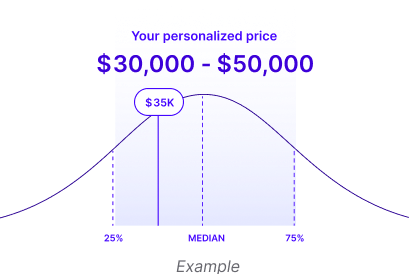EY
$22,000–$22,000per year
Fast, fair, easy pricing. No sales call required.
How much does EY cost?
When negotiating with EY for their CogniStreamer platform, it is critical to leverage the fact that they operate within a highly competitive consulting landscape, which may create opportunities for discounts or advantageous terms. Understanding their typical pricing structure, such as average contract values around $91,105, will assist in framing your negotiation strategy. Additionally, highlighting any unique value propositions your organization brings can strengthen your negotiating position.Given that EY's total proposed price for the offerings is $455,525, it is beneficial to discuss the scope of implementation and the expected outcomes to justify the investment. You may also want to inquire about potential savings from bundling services or from long-term commitment, as EY may be willing to negotiate better terms for larger deals or extended contracts. It's essential to be prepared with data on your company's purchasing history with EY, as this can also influence negotiations.
See detailed pricing for your specific purchase
AI Quote Analysis
Upload your quote to check if you’re getting a fair price, under 2 minutes and completely free.

How does EY price and package their products?
View pricing on EY's website
Product:
Not Specified
Not AvailablePayment Terms: Not SpecifiedPopular Features: Innovation management
Negotiating with EY
Negotiation Tips
Presenting competing quotes as alternatives has proven effective in negotiations. By mentioning that other providers have offered lower pricing for similar functionality, you can apply pressure on EY to reduce their quoted price. Ensure that you frame the competition realistically to reinforce your negotiating position.
In situations where you anticipate a significant cost increase, emphasize strict budget constraints, making it clear that a drastic reduction in services will accompany a proportionate increase in costs. This tactic can help in negotiating better pricing while communicating your requirements effectively.
Addressing potential overage charges upfront can be a powerful tactic in negotiations. If EY attempts to impose additional fees due to overuse, you can counter by suggesting that such fees should be waived, especially if your usage patterns are expected to stabilize in the future.
You can leverage the removal of auto-renewal clauses to maintain negotiating power. Making it clear that your finance team prefers not being bound to automatic renewals can provide leverage in future contract discussions.
Offering to participate in case studies or serve as a reference can be a valuable negotiation tool. Highlight how your commitment would be beneficial for the supplier’s marketing efforts and how they could reciprocate this by providing pricing concessions.
Considerations when buying EY
OwnershipPrivate
Fiscal year endJune 30
Best months to buyJuly, August, September
Payment TermsNet 30 days, Net 60 days, Quarterly payments
Upgrades/downgradesYes, EY offers both upgrades and downgrades for its services, making it easy for users to adjust their resources as their needs change.
Redline thresholdRedline threshold estimate is $20k.
Additional Info
What is EY?
Ernst & Young is a multinational professional services firm headquartered in London, England, United Kingdom.EY's 1 Product
EY
Ernst & Young is a multinational professional services firm headquartered in London, England, United Kingdom.Security and compliance
DPA available
SOC2 attestation
Annual penetration tests
News that may impact EY pricing or negotiations
Accountancy Today
EY to move to new Birmingham officeFebruary 3, 2025EY
denkstatt and EY join forces to become one of the industry's largest ESG and sustainability services companiesNovember 21, 2024EY
EY launches new Integrated Global Payroll Solution to transform and centralize payroll managementNovember 20, 2024